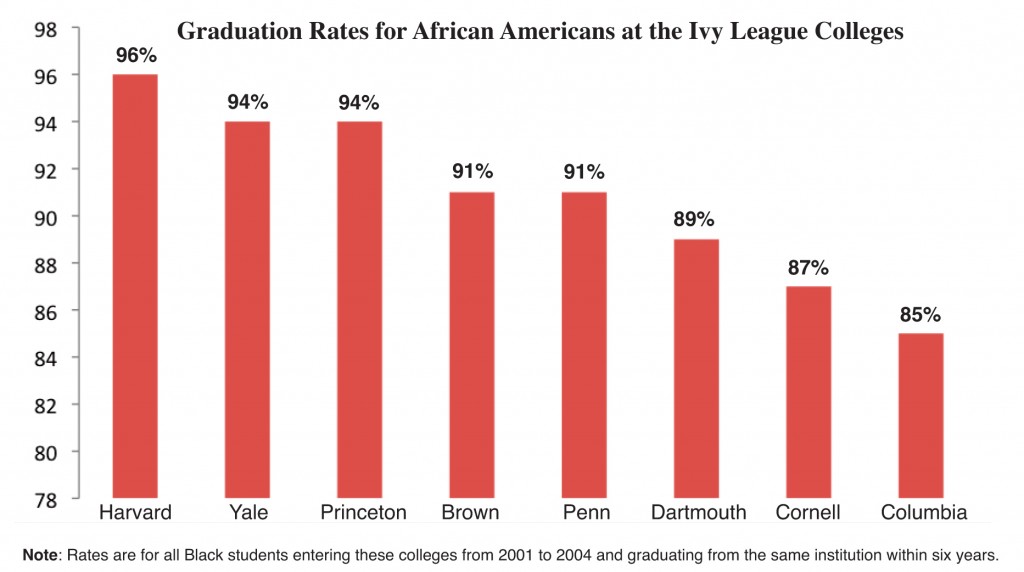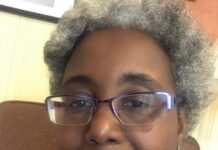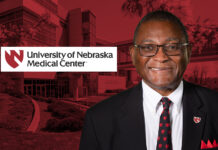The eight Ivy League colleges are generally considered to be among the most prestigious institutions of higher education in the nation. All of these institutions have graduation rates for African Americans of 85 percent or better. Nationwide the college graduation for African Americans is 44 percent.
At Harvard, 96 percent of all African-American students earn their degree within six years. The graduation for African Americans at Princeton and Yale is 94 percent. Columbia University trails the Ivy League with a still very respectable 85 percent graduation rate for African Americans.

White students have a higher graduation rate than the rate for African-American students at all eight Ivy League colleges. The largest racial gaps are at Dartmouth and Columbia where the white graduation rate is 7 percentage points higher than the rate for African-American students. The smallest gap is two percentage points at both Harvard and Princeton.













BRAVO BLACK GRADUATES!
It gave me great pleasure to read about the high graduation rate of 85% plus of Black student at Ivy League universities.
We need to know the causes of these high graduation rates in order to deal with the effects of low graduation rates among Black students in non-Ivy League universities.
I think that it is a combination of causes. Black students who attend Ivy League universities are necessarily smarter than Black students who do not attend Ivy League universities. But not all ‘book smart’ Black students attending an Ivy League university graduate. There are also intelligent Black students who attend non-Ivy league universities who also do not graduate.
Is the main reason to be found in the quality of the University or the quality of the students? I suspect that it is a combination of both.
There probably is no one cause, but multiple causes. These independent predictor variables interact with each other. The interactions produce a positive outcome for the vast majority of Black students at these eight Ivy League universities. On the other hand, the same interaction produces a negative outcome for a minority of Black students at Ivy League universities.
The fire that melts the butter also hardens the egg.
We need Action Research to find out which predictor variables have the greatest effect on the criterion variable,that is graduating from college.
Money is also a factor. Prior research has shown that money is the major reason why many African American students do not complete college. These eight Ivy League schools have very generous financial aid packages.
Other evidence that supports the position that money is a factor in the higher graduation rates of Black students can be found by comparing the graduation rates of Black student-athletes to Black collegians. Most Black student-athletes receive some form of compensation for their studies, and thus have higher graduation rates.
MONEY IS A MAJOR CAUSAL VARIABLE!
Yes, money is definitely as factor, probably the most important factor. On the other hand, there a Black students whose parents have money and they still drop out of Ivy League Universities.
In addition, there are Black students from poor families, who attend Ivy League Universities and they last the course and graduate.
Money alone cannot explain most of the variance between Black students who graduate and those who do not graduate from Ivy League Universities.
Considering the educational history of the African Americans attending Ivy League Universities, the ideology of attending higher learning and not completing a degree is probably unthought-of by the individual, the family and community at such level in society. It takes a circle of positive forces to ensure the success…
P.S. Usually such schools have “student retention” programs that reach out to minorities to ensure their education, graduation, and career success.
Affirmative action. If it wasn’t there, that number would be far lower. the number will most likely be replaced with Asian Americans. what? Don’t you believe me? search it up and then we might talk.
I wouldn’t think Ivy League colleges have this high number of Black students, does this classification include Black Africans and those in Diaspora? Also does this classification remove non Blacks educated in European colonized African countries of the world ? I would like to see this distinction.
In the case of Yale, it most certainly does include almost entirely the African, Caribbean and Pacific Islander “diaspora” and very few “locals.” That’s Yale-New Haven’s “dirty little secret.”
As someone who looks ‘black’ but was raised “white” upper middle class in the suburbs going to the “public elite” high school and having my one remaining parent unwilling to pay anything towarads college (but “fortunately” since she made well under the $65,000 threshold I didn’t have to pay) who managed to “eke out” my Master’s from Yale in 1996, let me say that it wasn’t without difficuty. I don’t know if the lesser Ivies have that full-tuition deal for the low-income households but I attribute any difficulties I had at Yale to be because of the surrounding area. I would have felt loads safer at either Princeton or Dartmouth, looking back at it all these years later. All these years later I still surprise people when I tell them I went to Yale when they’re looking at me. Apparently it’s because I’m “black” and they’re assuming I must have been “New Haven ghetto” which very decidedly means NOT “smart enough to get into Yale” which I realise is one of New Haven’s dirty little secrets but still, I maintain that the only reason Yale and Princeton “tied” on this score was because of Yale’s heavy reliance on “foreign” blacks in attendance practically to the exclusion of any of us who were raised here in this country. In fact the atmosphere there is so bad that it’s presumed you must be “from somewhere else” if you are black and go to Yale; that’s how bad the “where you from, where you from, no where you from originally” or “where you from really” load of crap around there is. If I’d even picked Harvard instead, at least neither Harvard nor M.I.T. are in a “ghetto” area where I would be automatically presumed to “belong” to the local ghetto “diaspora” and “look too stupid for Math” let alone for the Ivies, rather than someone who attended either place.
To this day I’d recommend black students aiming for the Ivies, to aim for ones which are at least situated in NOT the ghetto. For the sake of their sanity; for the sake of not being harassed by campus police on a regular almost-daily basis, etc. For me it’s been as if the minute I set foot off of Yale campus, I almost ceased to be taken for someone who had gone there let alone graduated, let alone in a STEM field. Always the surprise when they’re looking at me and I have to tell them I went to Yale. Usually that’s because they’re treating me in some way as if I look “too stupid to know Math” or have gone to any college at all let alone one of “those.”
You know what, it’s RACIST to be assuming in the first place that it’s some sort of “pleasant surprise” when black students graduate. Don’t you people GET that if we’re in the Ivies, OF COURSE we’re going to graduate, because we’re not “culturally” from that walk of society that doesn’t believe in graduating from college? I mean, we’re Ivy Leaguers first, not “black” first and everything else LAST.